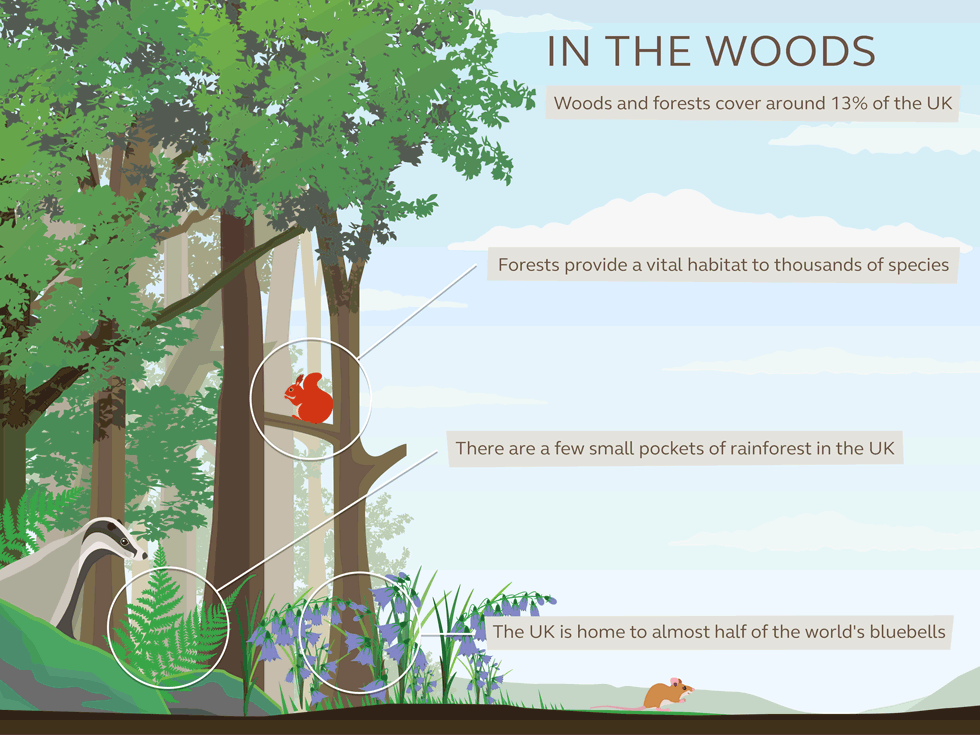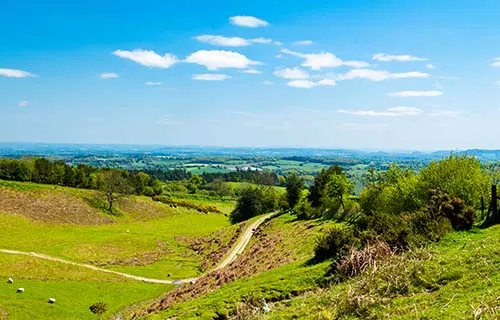The UK has long had a reputation as a green and pleasant land, and while farmland might account for most of that, a lot of Britain is covered in leafy forests with around four billion trees providing 15% woodland cover. Our roundup of the best woodland hikes in the country spans the largest man-made forest in England, the untouched medieval majesty of Hatfield Forest, the wild ponies of the New Forest, natural art installations and much, much more.
Woodland walks
Kielder Forest
The largest man-made woodland in England covering over 250 square miles, Kielder Forest is the perfect place to stretch your legs under a green canopy while being serenaded by woodland birds. The Lakeside Way makes the most of the forest’s 27 miles of shoreline as it follows Kielder Water, the UK’s largest artificial lake. The impressive wood and water skyline makes a wonderful backdrop for 20 pieces of public art, including the ultra-futuristic Belvedere shelter and the oversized swivelling Janus Chairs: just right for taking a breather and inhaling the panoramic views. Other highlights on the circular walk include Kielder Dam and Kielder Castle, formerly the Duke of Northumberland’s Hunting Lodge. You should also keep your eyes peeled for wildlife on the way including ospreys (which have been successfully re-bred in the area), roe deer and otters.
Grizedale Forest
Despite being a World Heritage Site boasting an array of hikes that cover forest, woodland and wetlands embellished with over 80 art installations and sculptures, hiking is only half of the reason to visit Grizedale Forest. Nestled in the Lake District between Coniston and Windermere, the forest is a hive of activity. As well as a large car park, a network of walking and cycle trails, children’s play areas and activity trails, an excellent café, picnic and BBQ area, you can also explore the forest via the hour-long Forest Segway tour or on electric bikes. The 4,000-hectare forest is also a haven for wildlife, home to buzzards, red kites, butterflies and dragonflies in the Brand Wetlands.
Hatfield Forest
Visit Hatfield Forest during May and June, and you’ll be confronted by seemingly endless golden plains as the forest fields erupt in a sea of 300 million buttercups. Then again, there’s no bad time to visit Hatfield Forest, Britain’s best-surviving medieval royal hunting forest home to over 3,500 species of wildlife and trees more than 1,000 years old. Come in autumn, and you’ll catch the changing of the guard as the leaves turn from green through a symphony of red and golden hues. Meanwhile, spring sees the historic forest waking up from its winter slumber, green shoots thrusting forward at every opportunity. And thanks to the management of the land, its history has been unchanged for centuries, making a trip to Hatfield Forest a little like time travelling.
Lakeside Way, Kielder Forest, Northumberland
- Total Distance: 27 miles
- Time to Walk: 2 days
- Best Time to Visit: Summer/Autumn
- Difficulty: Easy
A dual-purpose cycle and walking trail, the terrain is mostly flat and gentle, but there are several steep climbs towards the end of the route that might get you puffing. Kielder Forest also boasts one of the darkest skies in England, so make sure to look up when night falls and keep your fingers crossed for a cloudless sky.
Grizedale Forest, Cumbria
- Total Distance: 10 miles
- Time to Walk: 4 hours
- Best Time to Visit: Any
- Difficulty: Easy
There are plenty of walks to suit all ages and fitness levels. The longest is the Silurian Way, which takes you up and down Grizedale Valley including to Carron Crag, the highest point in the forest.
Hatfield Forest, Essex
- Total Distance: 11 miles
- Time to Walk: 5 hours
- Best Time to Visit: Start of summer
- Difficulty: Easy
While there are plenty of paths and trails to discover in the forest, our favourite hike starts and finishes at the nearby village of Hatfield Broad Oak. It takes you through Hatfield Forest before crossing back along the gentle countryside, finishing back at Hatfield Broad Oak where you’ll find several excellent pubs to rest your weary legs.
Ashdown Forest
Combining a rose-tinted stroll down memory lane and an invigorating nine-mile hike that takes in some stunning historical features, Ashdown Forest is one of our favourite woodland walks. A designated Area of Outstanding Beauty, Winnie the Pooh fans will instantly recognise the rolling wooded landscape as it inspired much of A. A. Milne’s Five Hundred Acre Wood, the famous home of Pooh, Piglet and the mysterious Heffalumps. And the best place to park is in the – yup, you guessed it – Pooh Car Park.
Offa’s Dyke
Running from Chepstow on the Severn Estuary to Prestatyn in North Wales, Offa’s Dyke is a highly rewarding 177-mike trek that takes in a wonderful variety of landscapes, crisscrossing the Anglo-Welsh border nine times. From the plunging Wye river valley to ancient woodlands, medieval castles, the Brecon Beacons, Clwydian Hills and remote moors, the path follows Offa’s Dyke for 70 miles, a large earthwork barrier up to 20m wide that was built in the 800s by the Anglo-Saxon king Offa.
Lyndhurst, New Forest
The most recent national park officially created in 2005, The New Forest is a vast expanse of woodland. It boasts 193,000 acres of forest located between Southampton and Bournemouth and is bordered by the Solent. With over 143 miles of paths spread over 200 square miles of forest, it’s a haven for hikers and wildlife fans, home to five types of deer, hundreds of bird species and thousands of wild ponies.
Ashdown Forest, Pooh Corner, East Sussex
- Total Distance: 9 miles
- Time to Walk: 4 hours
- Best Time to Visit: Any
- Difficulty: Easy
Offa’s Dyke, Wales/England
- Total Distance: 177 miles
- Time to Walk: 2 weeks
- Best Time to Visit: Spring/Summer
- Difficulty: Medium
Named one of Lonely Planet’s best walks in the world, the beginning stages of the trek cut through the glorious Forest of Dean, a wonderfully dense tangle of over 20 million trees, including oak, beech, ash and birch. If you make the journey in late spring, you’ll be confronted by thousands of flowering azaleas and rhododendrons and a carpet of bluebells. One stop well worth making along the way is Puzzlewood, said to be the inspiration for J. R. R. Tolkien and his Middle Earth forests. The almost-magical woodland has since been used as the setting for a wide range of TV shows and films, including Doctor Who and scenes from Star Wars: The Force Awakens.
Lyndhurst Circular, The New Forest
- Total Distance: 8 miles
- Time to Walk: 4 hours
- Best Time to Visit: Autumn
- Difficulty: Easy






